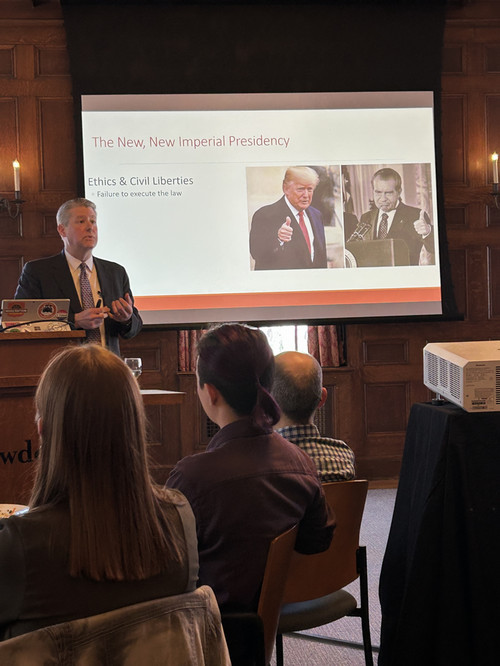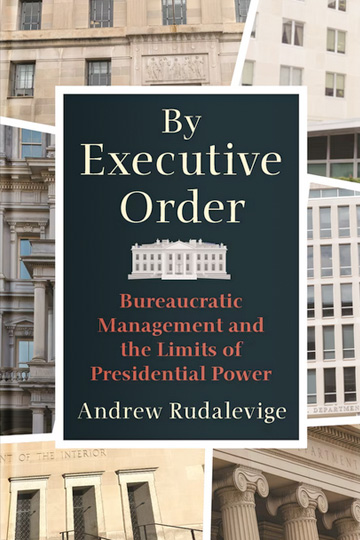Exploring the Limits of Presidential Power: Rudalevige on Trump’s First Hundred Days
By Tom PorterDonald Trump is not the first US president to be accused of behaving like a dictator, said Andrew Rudalevige. However, he added, the "vengeful nature" of many of the president’s second term executive actions is both “different and dangerous.”

Not even Richard Nixon, who resigned from the White House in 1974 in the wake of the Watergate scandal, attempted to use executive orders the way Trump has done, remarked Rudalevige. The Thomas Brackett Reed Professor of Government shared his thoughts on Trump’s first hundred days at the White House with faculty colleagues at a campus seminar on April 30.
Rudalevige, whose latest book explores unilateral action and the limits of presidential power, pointed out how President Obama was accused of exceeding his authority when he pushed ahead with US military intervention in Libya in 2011. He also cited a phrase used by the George W. Bush administration—that the president has a “zone of autonomy” within which Congress and the courts cannot intervene. Before this, Rudalevige reminded us, there was the afore-mentioned Richard Nixon’s battle with Congress over control of budget. (“Congress may pass the buck, but the president doesn’t have to spend it,” was the joke going around at the time, we are told.)
In the wake of the Vietnam War and Watergate scandal, he said, measures were enacted that were designed to rein in the power of the president. These measures have been steadily unraveling, observed Rudalevige, with the second Trump presidency continuing to push hard against them. For example, Russell Vought, Trump’s director of the Office of Management and Budget, has said he believes the Impoundment Control Act of 1974, which reasserted Congress’s control over the purse, to be unconstitutional. Another law from that period, the Privacy Act, which criminalizes the illegal sharing of data, presents a potential legal challenge to the data-gathering aspects of the Department of Government Efficiency and the huge amount of personal information being accessed. “The act puts in place criminal penalties for illegally sharing data,” said Rudalevige, “but criminal penalties only matter if the Justice Department is willing to bring charges.” At this point, he added, the Justice Department seems willing to be a tool of what Trump has called his “retribution agenda,” targeting individuals, firms, and organizations, particularly in the higher education and legal fields.

Adding to this, commented Rudalevige, is the Supreme Court’s ruling on presidential immunity last year.
“This states that almost nothing the president does in office can be viewed as a criminal act, including the use of pardons to obstruct justice.” The situation is exacerbated by the apparent weakness, or reluctance, of Congress when it comes to challenging the president, he said. “This idea was underlined by the Chairman of the House Appropriations Committee Tom Cole, a Republican, who said earlier this year that an appropriation ‘is not a law.’ This is false,” stressed Rudalevige. “Appropriations are passed into law by Congress and should be faithfully executed by president.”
One factor, however, does work against Trump and his agenda, said Rudalevige, and that is the court of public opinion. “Recent research shows public opinion is fundamentally against executive power and will check it. Polls show Trump’s approval ratings, which were never above 50 percent, are falling.” The challenge, he concluded, is for citizens and interest groups not to be “exhausted by the fire hose” of presidential actions, and for Americans to remind themselves that the US Constitution is “trinitarian, not unitarian.”


